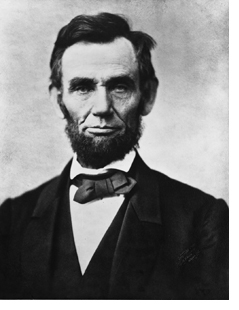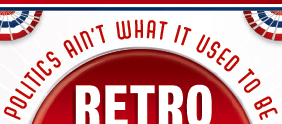|

Abraham Lincoln
(1809 - 1865) grew up in Kentucky
and Indiana in a farming family,
struggling to make a living in a
wild, frontier nation. As there
was little opportunity for formal
education, he taught himself to
read and write. The family moved
to Illinois in 1830, where
Lincoln worked as a rail
splitter, store clerk, surveyor
and lawyer.
Those who deny
freedom to others, deserve it not
for themselves;
and, under a just God, can not
long retain it.
Messrs. Henry L. Pierce, &
others. Springfield, Illinois.
April 6. 1859
In 1834 he began the first of
four terms in the Illinois
legislature, while growing his
law practice. Politically at that
time he was a Whig, and
 campaigned
vigorously for William Henry
Harrison in 1840. The
anti-slavery faction of the Whigs
were absorbed by the Republican
Party, and it was as a Republican
that Lincoln first came to
national attention, with a series
of debates with his longtime
nemesis Stephen Douglas. campaigned
vigorously for William Henry
Harrison in 1840. The
anti-slavery faction of the Whigs
were absorbed by the Republican
Party, and it was as a Republican
that Lincoln first came to
national attention, with a series
of debates with his longtime
nemesis Stephen Douglas.
Lincoln and Douglas were
campaigning for one of Illinois'
Senate seats, and agreed to seven
debates throughout the state,
which dealt primarily with the
expansion of slavery into the new
territories, something Lincoln
vehemently opposed. Lincoln
lost the election but was now a
known entity on the national
political scene, and on May 18,
1860, he secured the Republican
Party nomination for the
presidency.
A house divided against itself
cannot stand. I believe this
government cannot endure
permanently half-slave and
half-free. I do not expect the
Union to be dissolved - I do not
expect the house to fall - but I
do expect it will cease to be
divided. It will become all one
thing or all the other.
"A House Divided": Speech at
Springfield, Illinois June 16,
1858 
The Democratic Party was
fractionalized that year, and
they split into the Northern
Democrats, who nominated Stephen
Douglas, and Southern Democrats,
who nominated John
C. Breckenridge. A last party,
the Constitutional Party,
comprised of those who could not
abide by either the Republicans
or the Democrats, nominated John
Bell.
The Republicans felt that
although Lincoln was respected
and admired by many, he needed to
be more accessible as a
personality. They highlighted his
humble beginnings, with
particular attention on his
previous work as a rail splitter.
Soon he was the "Rail
Candidate."
Whenever I hear any one arguing
for slavery I feel a strong
impulse to see it tried on him
personally.
Speech to One Hundred Fortieth
Indiana Regiment March 17,
1865
The split among the rival parties
proved beneficial to Lincoln. He
earned less than forty percent of
the popular vote, but due to his
popularity in the  more
popular northern and free states,
he was able to win an Electoral
College majority. more
popular northern and free states,
he was able to win an Electoral
College majority.
It surprised no one that he won
zero southern states; that winter
several southern states seceded
and declared themselves the
Confederate States of America,
and the Civil War began soon
after.
I am rather inclined to silence,
and whether that be wise or not,
it is at least more unusual
nowadays to find a man who can
hold his tongue than to find one
who cannot.
Remarks at the Monongahela
House, Pittsburgh, Pennsylvania
February 14, 1861
The Union prevailed and Lincoln
was re-elected in 1864, but was
assassinated by John Wilkes Booth
on April 14, 1865 while he
attended a play in Washington,
D.C.
|














